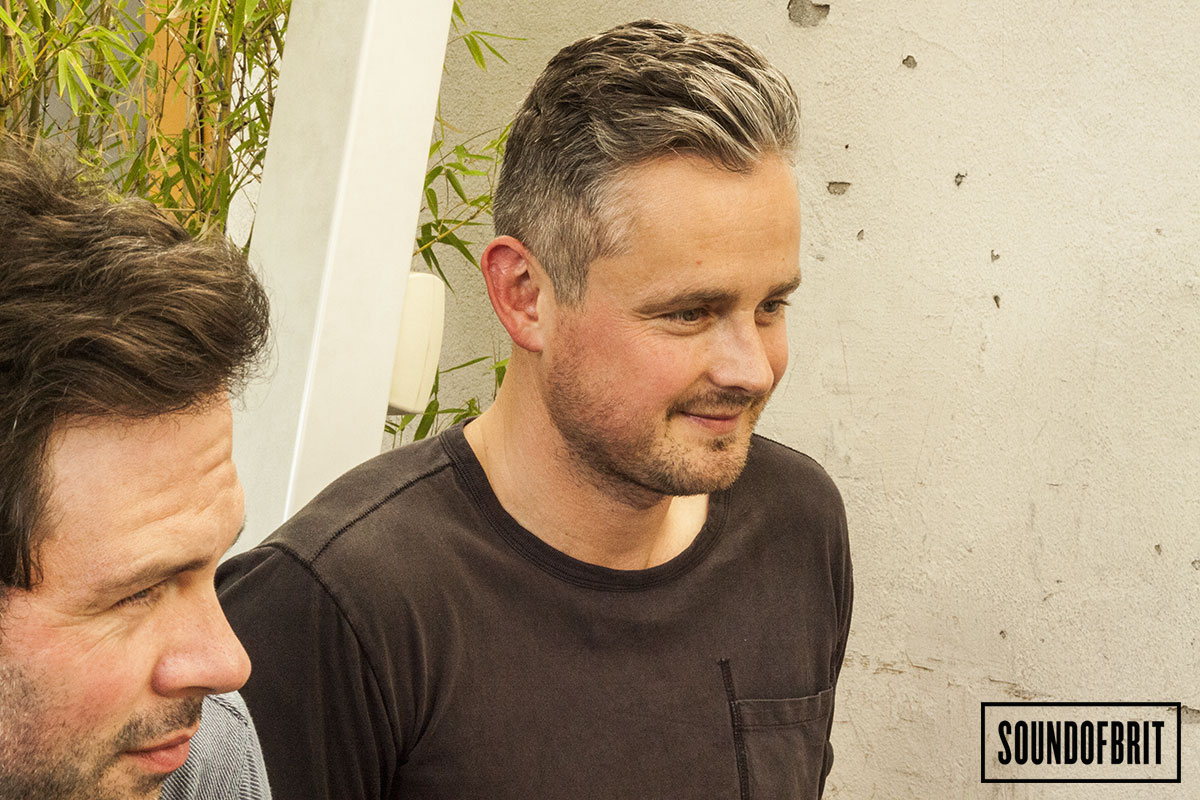
21 Août Interview Keane
Keane signe son grand retour avec un nouvel album, Cause and Effect, dont la sortie est prévue le 20 septembre prochain. On a voulu les rencontrer pour en parler. Vous trouverez la version traduite en français en bas de cette page. Enjoy !
How does it feel to be back in Paris after such a long time ?
Richard : It is lovely, it’s not a very long time for me, actually, I was in Paris in November for my wedding anniversary. We all love this city. We grew up in the South East of England so school trips and holidays to France were a common thing. We also made some of Perfect Symmetry here.
Tom: I was in Paris last Monday because I went fishing in the Seine, down to the South-East or wherever it is of Paris last week. I am one of these weird guys who goes fishing in France.
Did you catch anything?
Tom: No, I caught nothing, but I’m glad I haven’t come this week, because it would’ve been too hot, but it was nice. I love coming to France. I come all the time with my family and all of that. You’ve got everything in France: mountains, beautiful countryside, great coastlines, you’ve got Paris. It’s just a pretty great country and it’s only two hours on the train from the UK now, so it’s a pretty great place to visit.
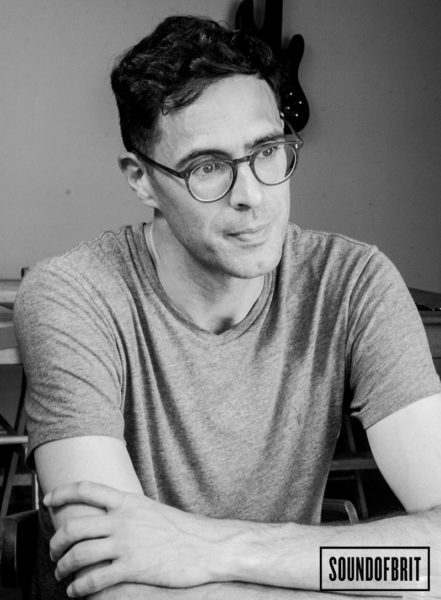
Did you have time to visit today ?
Tim : Not today. We got there this morning and we’d need more time because we’re all very interested in the humanity, the culture and it’s really nice when you can explore that but not today.
Jesse: No, we got off the train over this morning. It was lovely just looking out of the window of the Eurostar and see the countryside and all the lovely houses.
Tom: We had to do some rehearsing today. So we basically had to come off the train, so we haven’t had any time. We’re ready to go, ready as we’ll ever be.
Last time we had an interview with you, Tom you said Tim had written some songs with you, was it the case for this album ?
Tim : We made this album following the same process that we’ve always done. It’s really important to me to try to write songs that the other guys love. Tom has to sing them and to feel passionate about them so probably the first part of the process for this album was to send some of the songs to Tom and ask « are there any in there that you like ? » and him picking up the ones that he liked was the beginning of the album.
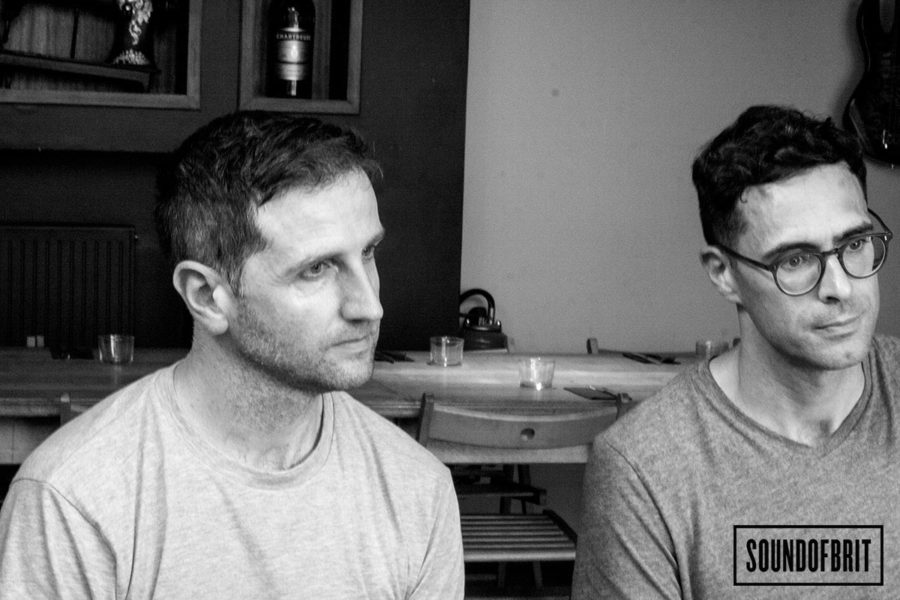
The Way I feel is a really intense song. Did you find your inspiration from your own emotions or someone else’s ?
Tim : Pretty much all of my songs are about myself. The whole album is a response to a heartbreak and my marriage, each song is a different story to do with that, or a different aspect of it maybe. I suppose The Way I Feel is really about your mental response to a situation and I felt really like a failure I suppose, like I failed at something really important. I felt like I let people down and then from there your mind can play tricks on you to the point where you can’t do anything, wondering what’s the point of living. The strange thing about the way your mind works in those situations is that you feel like you’re the only one to feel like this and of course, the more you talk to people the more you realize that everyone has these things going on so it’s been really nice for us to see that people respond to it. I was worried that it would be too obscure, that people would be like « what is the song about ? It doesn’t make any sense » but as you said people pick up very quickly and it’s great.
Richard : A lot of people have came to me with the same reaction and said that lyrically it meant a lot to them. In the depth of despair I guess sometimes nothing will help, but sometimes just knowing that someone else is putting it into words is a positive thing. When the rest of us heard this song ,only then we realized what a pit of despair Tim sank into, I don’t think it was possible to appreciate it until that point. Like a lot of people sometimes, it’s hard to talk face to face about things but Tim managed to put it into songs so yes, it’s a strong one (laughs).
Tom: I think that song sort of conveys the feeling of confusion about thinking while you’ve had a seemingly normal upbringing and you seemed like a happy kid and everything seemed to have gone really well. But at the end of the day, you feel like shit, which I think a lot of people can identify with.
Jesse: And feeling like it’s only you feeling like that.
Tom: Yeah, absolutely. It’s funny, in this day and age we’re more connected than we have ever been, via social media, and yet I think people are feeling more alone than ever. And yet at the same time, it feels like there’s a scrutiny about everything that you do. Everything is up there in the virtual world. I certainly noticed. My wife works a lot with teenage girls. The amount of pressure that is on them from their peer groups, to be a certain way when they don’t fit in. And there’s even like, she was telling me about these kids who will set up websites to slag off, you know to be mean about people in their school. It’s everyone really, so that seems a very dark side to it. And I suppose also the result of people being stuck in their phones more. There’s less actual genuine dialogue and connection with each other. I think it’s a world people increasingly feel more isolated and alone with their problems. Those problems can often be magnified by social media and all of that stuff. So it’s no wonder to me, that there’s a kind of mental health, certainly in the UK, there’s a real kind of crisis with it.
Jesse: But it snowballs, doesn’t it, because people go to their phone or whatever to get a feeling of connection. And it’s almost like they go out of practice, doesn’t it, actually talking to people and that gets worse.
Tom: All of human life, the most important thing is like relational. If you’ve got no one to tell your story to, no one to trust you, no one who loves you. Even just someone to sit and talk to over a cup of tea. If you don’t have that, life is meaningless. There’s no connection. So yeah, it’s sounding to me like, this whole thing, technology has moved up so fast and our psyche hasn’t quite caught up with it yet. I hope there’ll be some sort of correction, where we’ll have a more measured view of social media and technology. I realize I look at my phone all of the time and I hate myself for it, but I can’t quite get out of the habit yet.
Jesse: When everyone’s looking at their phone, you’re like, I’m not gonna just sit there.
Tom: *laughs* Yeah, yeah. Everyone does it though. It’s like the knee jerk response. Something in my therapy that I’ve had to learn to cope with is, like, silence. I’d go and see my therapist and there were times when I felt like I had nothing to say and I find that incredibly uncomfortable. But he’s really good about it, and he says you’ve got to sit with the silence. You’ve got to be with someone in the room and be o.k. with just being and not wanting to have your phone. Or say something kind of, you know, meaningless to fill the gap. You know, that’s also o.k., but you’re still there connected to that person even if you’re not saying anything. But anyway, very interesting.
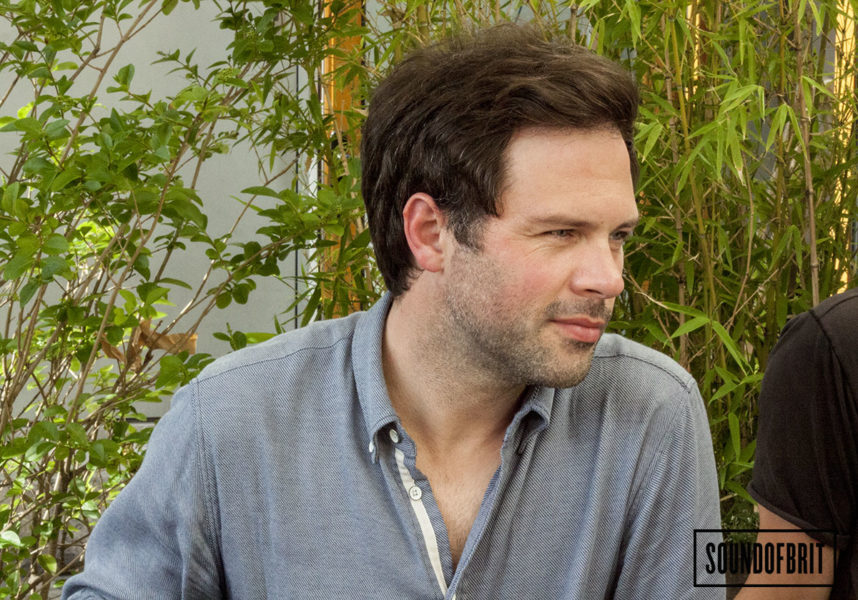
I think it hits you the same way Hopes and Fears hits you even if it hits you differently as you grow up because you begin to understand some things you didn’t before.
Richard : It feels like when you’re young things are quite simple, or simpler, a love song is all about love and a break up song is all about « I don’t want to see you » and then you get a bit older and things get a bit more complicated, there’s more context, collateral, children or houses or whatever, things you need to deal with and you can’t just walk away and say « we’re never ever getting back together » (laughs) No disrespect to songs like that it’s more complicated and I think Tim captured that with the lyrics and I think that we all feel pretty strong about it.
Could you describe the album in a few words for those who haven’t heard it yet ?
Tim : I’d say incredibly honest. I think you have to face the truth sometimes and I think there’s a lot of truth on this record.
Richard : I would think of it as a soundscape, there’s no adjective from soundscape, it’s like film-make, it’s a very rich album, sonically, like a wide screen. Parts of it are quite dense in a sort of overwhelming way but there is a lot going on in places that I think people are going to enjoy.
Jesse: Sad and happy.
Tom: *Laughs* I’d say it’s a break-up album, yeah. I mean, so many great records are about break-ups. But I suppose the difference is Hopes And Fears was when we were much younger and this is a record that is about a fall out of a break when you’re much older, and it’s much worse. It’s much worse. But it’s also, well, you know, all the kind of best music comes from the deepest sadness, I think. Most of the time anyway and I think there’s a lot, clearly you know, Tim’s life took a really bad turn and, but, there’s a positive side to it. It means there’s a bunch of great songs that’s come out *laughs loudly*
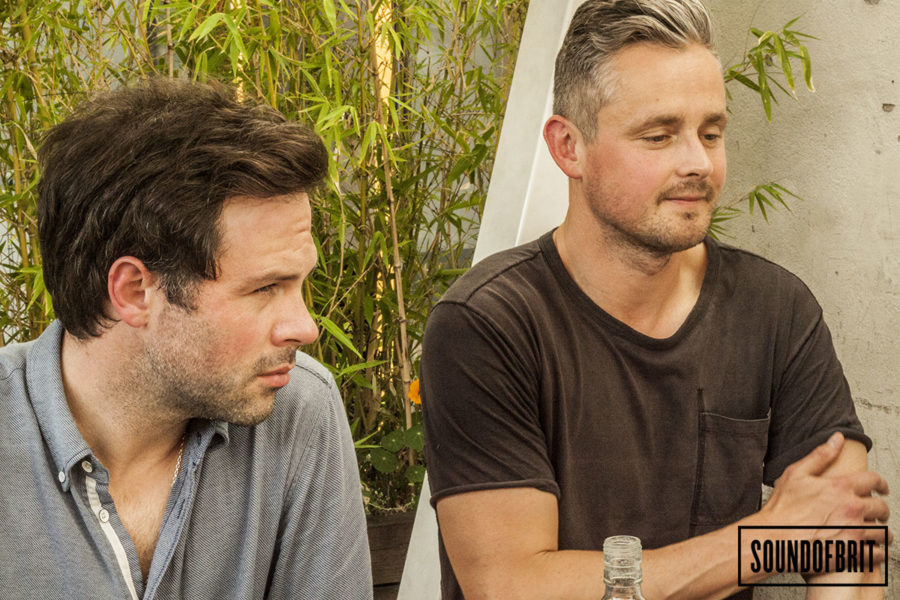
How is this album different from the previous ones according to you ?
Tom: I think we’ve been pushed with the sound of it and working with a producer who was much more stubborn and strong willed than any producer we’ve worked with before. Very often we felt in the past, like the demos sounding quite complete and really good and so it’s just a case of, kind of developing those and making them sound even better. But with this record there was a bit of chat around the demos. That they were a bit safe. The songs were great, but the demos weren’t doing the songs that much justice. So yeah, we got this guy David Kosten, who I know quite well. We’ve kind of known him, all of us, for quite a long time and so he came aboard. He’s much more of a Phil Spector kind of producer. Strong willed and adds a lot of his own ideas. Be he’s really pushed us, made us fight for everything, we thought that was good.
Jesse: He stopped us from doing it and made us do everything differently.
Tom: Yeah. But I also think, that was definitely the main part of this process but also technically the way we recorded stuff. I personally think, like from a singing point of view, no one has ever lavished that much time and effort on the sound of my vocals. And I do think though, this is definitely the best. But my singing on the record is definitely the best singing I’ve ever done on a Keane album. That’s my own opinion.
Did you write the songs with the thought of playing them live ?
Tim : I think it’s probably our most studio based album. In the past the songs have always been rooted into live performances in the studio. This one is much more arty, like a collage of sounds and ideas and creating, piecing something together in a very experimental way, trying a lot of different things and then using those blocks to create finished tracks, when we came to try to play them live it’s been really challenging but again hopefully in the context of a live show when we play songs from all the albums, so it would be an interesting mix.
Did you use any new instruments ?
Richard : Yes, at the start of the album there’s quite a long instrumental section where Tim was playing a little kalimba, it’s like metal bars that are tuned and you flick them with your thumbs, and they make a little metallic sound, and I was sampling those, sort of right next to it, and reversing them and playing them and the whole thing was being sort of mic’ed up, so even at the top of the record it’s quite weird and different…
But we were recording things, like Tim was saying, instead of tracksing it and then playing down a song, we were just kind of doing things as we were going. And we would leave these big holes in the middle of songs where we didn’t know what was gonna go there, but we knew that if we tried enough things, some inspiration would strike and we would come up with something. And we did, but for a long time for a couple of songs there were these big holes, where there was nothing happening. And we were waiting to work out what we were gonna put there, which is really fun.
So you could say that it’s big change with your way of working for this album compared to the previous one? Experimenting.
Both : Yeah, definitely.
It still sounds like Keane, but it sounds new.
Tim : That’s the dream, I suppose? That’s what you want.
Richard : I think Tom’s voice is very powerful an very distinctive, in the way he sings, and in the way that Tim writes melodies for him. That buys you a lot of freedom. It still going to sound like Keane. Because it’s Tom singing Tim’s songs, and that buys you freedom to play around underneath that, that gives you a lot of creative options.
Do you already have a favourite one among the tracklist or does it change every day ?
Richard : There’s song called I’m not leaving that’s always been one of my favourites, from the very first demos. I think it’s a song that fans will absolutely adore, you know as music fans we often find a song on an album that is not necessarily a single, but you really just embrace.
Tim : It does change a lot. There’s one called Strange Room which is really simple. It’s very soulful, and a very unusual vocal for Tom. I just love the story of it. We might try to play that tonight.
Jesse: Oh, it keeps changing for me. I think Strange Room is amazing.
Tom: Yeah, I’m Strange Room as well. That was one of the ones that was on the original set of songs Tim had. And I thought it was such an amazing song. I love the piano riff. Basically the second verse is about when he got busted for drink driving, but the whole way that story is told..he just… funny.
Jesse: Yeah, so tragic.
Tom: *laughs* Yeah, so yeah, that’s my favourite one, definitely.
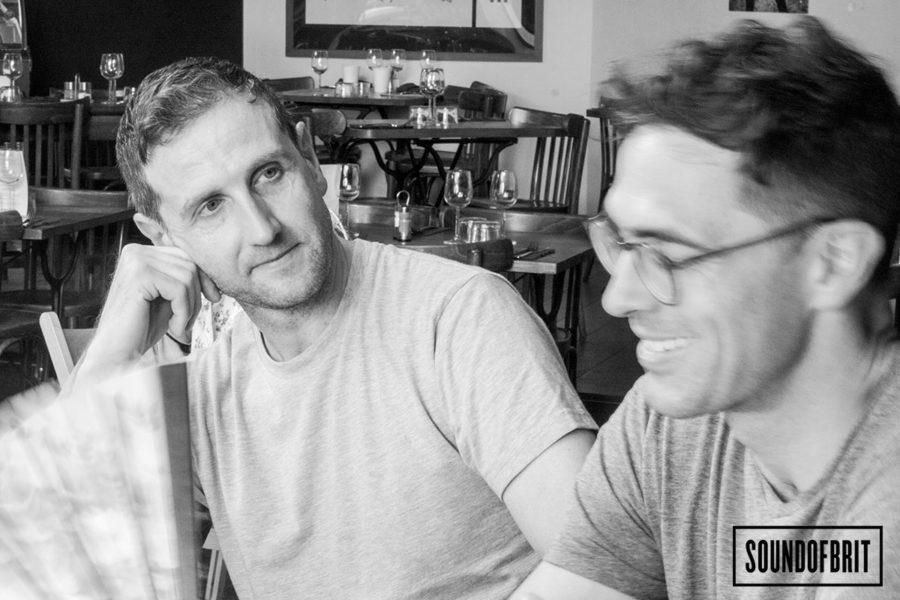
What pushed you to start working together again? There has been a long gap after The Wave.
Richard : We talked about it a long time ago. Tim had written a lot of these songs, we’d all heard them, and we thought it was gonna be a solo album that Tim was making. And the he wasn’t sure about it. Then we were asked to play this charity show in our hometown. And everyone was up for doing that. It was this Music Outreach project, it’s a really cool thing to do and it’d just be fun. And I think we were quite surprised about how excited we all were about doing that show together, and just hanging out. And then you added the other songs to it. So yeah, it did take a little while, but we all have other things going on, we all have children, people we need to see in our lives. It’s not as simple as it was with Hopes & Fears where you could just move to France for three months! So we had to do things differently.
The show sold out in under a minute. Are you planning on coming back to play in France anytime soon?
Richard : We really want to go to different places [in France]. I’d be surprised if we don’t come back to Paris.
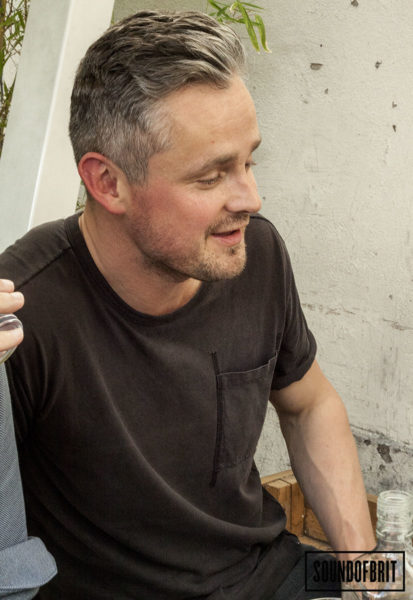
FR
Bonjour ! Alors, contents d’être de retour à Paris après une si longue pause ?
Richard : C’est super, mais dans mon cas ça ne fait pas trop longtemps, je suis passé à Paris en novembre pour mon anniversaire de mariage. Nous adorons tous cette ville. Nous avons grandi dans le sud est de l’Angleterre, où les voyages scolaires et les vacances en France étaient fréquents, donc nous sommes très contents d’être de retour à Paris. Nous avons également enregistré une partie de Perfect Symetry à Paris.
Tom : Je suis parti pêcher dans la Seine lundi dernier, je fais partie de ces gens étranges qui vont pêcher en France.
Tu as réussi à attraper quelque chose ?
Tom : Non je n’ai rien attrapé, mais je suis content de ne pas être venu cette semaine, parce qu’il fait trop chaud. J’adore venir en France, je viens tout le temps avec ma famille. Vous avez de tout ici : des montagnes, la campagne, de belles plages, Paris… C’est un super pays, seulement à deux heures de train du Royaume-Uni.
Vous avez eu le temps de visiter un peu aujourd’hui ?
Tim : Aujourd’hui non, mais nous avons passé pas mal de temps ici. Nous sommes arrivés ce matin, et nous aurions besoin de plus de temps, car les gens et la culture française nous intéressent beaucoup. Ce sera pour une autre fois.
Jesse: Non, nous sommes descendus du train ce matin, c’était super d’observer la campagne et les belles maisons à travers la fenêtre.
Tom : On a dû commencer directement les répétitions en arrivant; donc nous n’avons pas eu le temps de visiter. Nous sommes prêts à jouer maintenant, aussi prêts qu’on puisse l’être en tous cas.
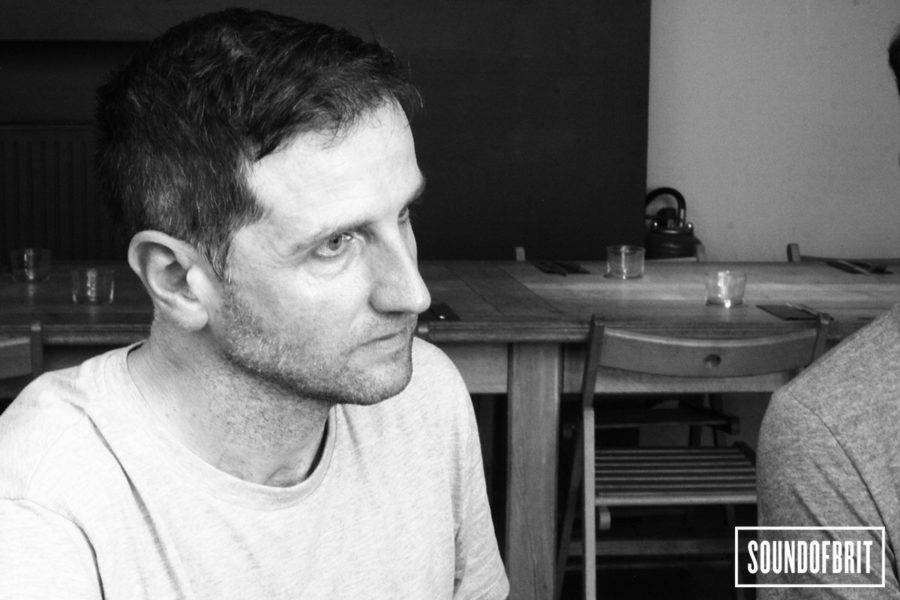
La dernière fois que nous avons parlé à Tom, il nous a dit avoir écrit quelques chansons avec toi pour son album solo, avez vous écrit les chansons de ce nouvel album ensemble également ?
Tim : Nous avons travaillé sur cet album de la même façon que pour les précédents. Il est très important pour moi d’essayer d’écrire des chansons que les autres membres aiment aussi. Tom va devoir les chanter et s’investir dans celles-ci, donc la première partie du processus a été d’envoyer les chansons à Tom pour voir si elles lui plaisaient et pour qu’il puisse choisir ses préférées. C’est ce qui a lancé la création du nouvel album.
The Way I Feel est une chanson très intense, t’es-tu inspiré de tes propres émotions pour l’écrire ou d’une personne que tu connais ?
Tim : Quasiment toutes mes chansons parlent de moi. L’album entier est la réponse à une rupture amoureuse (ndlr : son mariage), chaque chanson est une histoire différente en rapport avec ce thème, ou un aspect différent de celui-ci. J’imagine que cette chanson est une réponse émotionnelle à une situation, je me suis vraiment senti comme un raté, comme si je n’avais pas réussi quelque chose d’important. J’ai l’impression d’avoir laissé tomber certaines personnes et à partir de là, ton esprit peut te jouer des tours au point que tu ne puisses plus rien faire, juste questionner la vacuité de ton existence. Ce qui est étrange dans ce genre de situations, c’est que tu as tendance à avoir le sentiment d’être le seul à ressentir ces émotions, mais évidemment, plus tu en parles aux gens, plus tu te rends comptes que tout le monde traverse la même chose. Nous avons donc été agréablement surpris de voir que les gens réagissaient à cette chanson. J’avais peur que ce titre soit trop sombre, que les gens disent : « De quoi parle cette chanson ? Ça n’a pas de sens. » mais les gens se sont vite identifiés et je trouve ça super.
Richard : Beaucoup de gens sont venus me voir avec la même réaction, ils m’ont dit que les paroles les avaient beaucoup touchées. Quand on est au plus bas j’imagine que rien ne peut vraiment aider, mais je pense que parfois, juste le fait de savoir que quelqu’un d’autre a vécu la même chose et l’a retranscrit en paroles peut donner un résultat positif. Ce n’est que lorsque nous avons entendu cette chanson pour la première fois que nous avons réalisé à quel point Tim se sentait mal. Je ne pense pas que nous étions capables de l’apprécier à sa juste valeur avant de comprendre ça. Beaucoup de gens ont du mal à exprimer leurs sentiments devant les autres, mais Tim à réussi à les retranscrire en chanson donc oui, on peut dire qu’il s’agit d’une chanson intense ! (rires).
Tom: Cette chanson véhicule le sentiment de confusion ressenti lorsque l’on pense avoir eu une enfance heureuse, une vie normale, mais qu’à la fin de la journée, tu te sens mal, comme beaucoup de gens.
Jesse: Tu as l’impression d’être le seul à ressentir ça.
Tom : Exactement. L’ironie, c’est qu’aujourd’hui, grâce aux réseaux sociaux, nous sommes plus connectés que nous ne l’avons jamais été, mais je pense que les gens se sentent plus seuls que jamais. En même temps, on a tout le temps l’impression d’être observé. Tout est disponible dans le monde virtuel. Ma femme travaille avec des adolescentes, elles se soumettent à une pression énorme de la part de leurs camarades si elles ne rentrent pas dans le moule. Elle m’a parlé d’un élève qui avait même crée un site pour parler dans le dos des autres. Tout le monde est concerné, je pense que c’est l’aspect un peu sombre de tout ça. Le résultat, c’est que de plus en plus de gens restent scotchés à leur téléphone. Il y a moins de dialogue et de réelle connexion entre les gens. Les gens se sentent de plus isolés et seuls face à leurs problèmes. Ces problèmes peuvent souvent être accentués par les réseaux sociaux. Du coup, ça ne me surprend pas qu’il y ait autant de maladies mentales qui se déclarent.
Jesse: Cela fait un effet boule de neige, pas vrai, les gens vont sur leur téléphone pour rechercher un semblant d’interaction, mais c’est comme s’ils n’étaient plus capable de se parler en vrai, et ça devient de plus en plus difficile pour eux.
Tom: L’aspect le plus important humainement est l’aspect relationnel. Si tu n’as personne à qui raconter tes histoires, à qui te confier, personne qui t’aime… Ou juste quelqu’un à qui parler autour d’une tasse de thé, ta vie n’a pas de sens. Il n’y a pas de connexion. La technologie a évolué tellement vite que notre cerveau ne l’a pas encore rattrapée. J’espère que c’est un problème qui se réglera, et que l’on aura une vision plus nuancée des réseaux sociaux à l’avenir. Je me rends compte que je regarde mon téléphone tout le temps et je me déteste pour ça, mais j’ai du mal à me débarrasser de cette mauvaise habitude.
Jesse: Quand tout le monde est bloqué sur son téléphone, tu te sens obligé de faire pareil parce que sinon tu ne sais pas quoi faire de ton corps.
Tom:*Rires* Exactement. Tout le monde le fait cependant. C’est comme un réflexe, comme quand le docteur tape sur ton genou avec un petit marteau. J’ai appris à gérer le silence en thérapie. J’allais voir mon psychiatre et je n’avais parfois rien à dire, et j’en éprouvais un certain malaise. Mais il l’a très bien géré, et m’a dit que je pouvais rester assis là en silence si je le souhaitais. Que je devais apprendre à partager une pièce avec quelqu’un en silence, sans me sentir mal à l’aise pour autant, juste en étant moi-même, sans téléphone, ou sans éprouver le besoin de dire quelque chose juste pour meubler le silence. Ce n’est pas un problème non plus, et ça reste une sorte de connexion avec cette autre personne, même si je ne dis rien. Enfin bref, c’est très interessant. *rires*
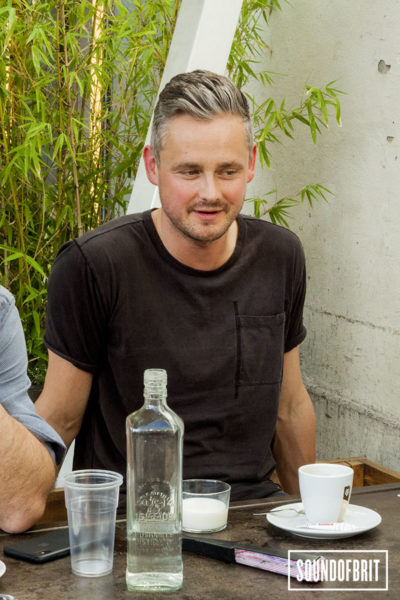
En quoi diriez-vous que cet album est différent des précédents ?
Tom : Je pense que pour une fois nous avons travaillé avec un producteur beaucoup plus obstiné que n’importe quel autre. Au début, on trouvé que les démos étaient plutôt complètes, mais il nous a poussés à les rendre encore meilleures. Nous avons pas mal discuté autour de celles-ci. Les chansons étaient supers, mais les démos ne leur rendaient pas justice. On a donc appelé David Kosten, que je connais bien. Cela fait un bout de temps que nous le connaissons, en réalité. Il a donc rejoint l’aventure. Il me fait penser à Phil Spector. Déterminé et toujours prêt à rajouter ses propres idées. Il nous a vraiment poussés pour que l’on se batte pour tout, et c’est une bonne chose.
Tom: Personne n’a jamais passé autant de temps, ni fait preuve d’autant d’acharnement sur le travail de ma voix. Elle sonne définitivement mieux. Le chant sur cet album est le meilleur que j’ai jamais enregistré, à mon avis.
Comment décririez vous l’album en quelques mots à quelqu’un qui ne l’a pas encore entendu ?
Tim : Je dirais extrêmement honnête. Je pense que parfois il faut affronter la vérité en face, et je pense qu’il y a beaucoup de vérité sur cet album.
Richard : Je dirais qu’il s’agit d’un panorama musical, comme un court-métrage. C’est un album très riche, en termes de son, comme un grand écran. Certaines parties sont très denses, d’une façon qui peut nous submerger, mais il y a beaucoup de choses dedans que les gens vont apprécier.
Jesse: Triste et joyeux.
Tom: *rires* Je dirais que c’est un album de rupture. Tellement de bons albums parle de ce thème. Je suppose que la différence avec Hopes and Fears est que nous étions beaucoup plus jeunes quand il est sorti. Cet album parle des conséquences d’une rupture à notre âge, ce qui est bien pire. Mais bon, les meilleures chansons ont souvent une peine très profonde comme origine. La vie de Tim a pris un mauvais tournant, mais le côté positif, c’est que pleins de bonnes chansons sont sorties de cette situation ! *rires*
Je pense qu’on peut y trouver des similitudes avec certains titres d’Hopes and Fears, même si on ne comprend le sens de certains paroles qu’une fois adulte..
Richard : Je pense que lorsqu’on est jeune, les choses sont relativement simples, ou moins compliquées. Une chanson d’amour est pleine d’ »I love you » et une chanson de rupture a pour unique thème « Je ne veux plus jamais te voir », ensuite on vieillit et les choses se compliquent un peu, il y a plus de contexte, des dommages collatéraux, des enfants ou une maison qui se rajoutent à l’équation, des choses que l’on doit gérer, qu’on ne peut pas simplement laisser derrière soi en mode « we’re never ever getting back together » (rires). Pas que je n’aime pas ce genre de chansons, mais parfois les choses sont plus compliquées que ça, et je pense que Tim a parfaitement su le retranscrire et que nous avons tous le même avis sur la question.
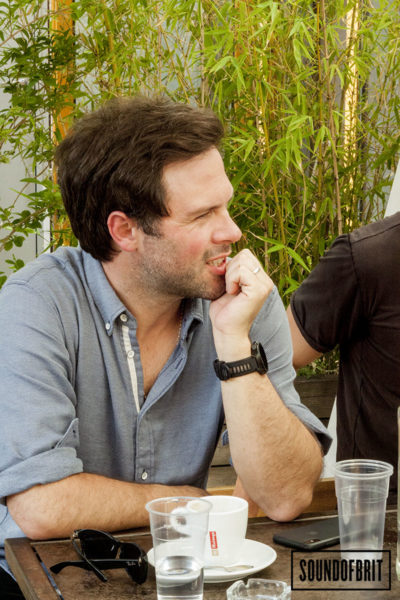
Avez-vous composé les chansons dans l’optique de les jouer en live ?
Tim : Je pense que c’est notre album le plus proche d’une version studio. Pour les précédents albums, les chansons étaient toujours écrites pour êtres jouées. Celui-là est beaucoup plus créatif, comme un collage de sons et d’idées qui créent, assemblent les choses d’une façon très expérimentale, en essayant toutes sortes de procédés différents pour ensuite transformer ces blocs d’idées en chansons terminées. Lorsque nous avons essayé de les jouer en live, cela a représenté un véritable défi pour nous, mais une fois de plus, dans le contexte d’une performance live, quand nous allons jouer certaines chansons de l’album, cela va donner un mélange intéressant.
Avez-vous une vague idée des chansons que vous allez jouer ce soir ?
Richard : Nous nous sommes entrainés sur certains titres du nouvel album, nous allons probablement jouer des chansons que nous n’avons encore jamais jouées ce soir mais nous n’avons pas encore fait notre choix.
Avez -vous utilisé des instruments nouveaux ou inhabituels lors de la production de cet album ?
Richard : Oui, au début de l’album il y a une section instrumentale assez longue sur laquelle Tim joue du Kalimba, un instrument avec des barres métalliques que tu fais vibrer avec tes pouces pour obtenir un son métallique et je composais pas dessus d’une certaine manière, ou j’inversais les sons et le tout était enregistré via un micro, même la fin de l’album est assez étrange et différente, mais comme l’a dit Tim, au lieu d’enregistrer et de minimiser nos chansons, on avançait au fur et à mesure et on voyait ce que ça donnait. On laissait de gros blancs en plein milieu des chansons, on ne savait pas comment on allait les remplir mais on savait que si on essayait suffisamment de choses, l’inspiration viendrait, et au final c’est ce s’est passé, mais pendant une longue période nous avions ces quelques chansons pleines de trous dans lesquels il ne se passait rien et nous attendions juste de trouver ce que nous allions en faire, ce qui s’est avéré plutôt amusant.
On peut donc dire que vous avez légèrement modifié votre façon de travailler sur cet album par rapport aux précédents.
Tim et Richard : Oui exactement.
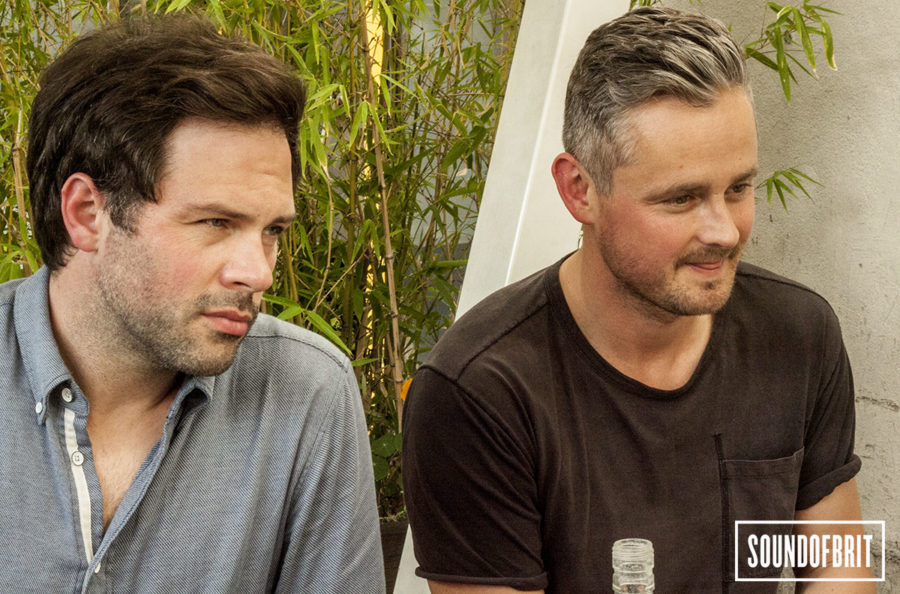
C’est toujours du Keane, mais avec un son nouveau.
Tim: C’était notre intention, j’imagine. C’est ce à quoi nous aspirons.
Richard : Je pense que la voix de Tom est particulièrement puissante et reconnaissable, dans sa façon de chanter, et à travers la façon dont Tim écrit des mélodies pour lui. Cela nous permet beaucoup de liberté. Nous sonnerons toujours comme Keane. Parce qu’il s’agit toujours de Tom chantant les mélodies de Tim, ce qui nous offre un large choix d’experimentation, un plus grand nombre d’options créatives.
Avez-vous déjà un morceau préféré sur l’album, ou bien cela change tous les jours?
Richard : Il y a ce morceau qui s’appelle I’m not leaving qui a toujours fait
partie de mes préférés, depuis les premières démos. Je pense que c’est une chanson que les fans vont adorer. En tant que fan, il y a toujours sur un album un titre qui ne fait pas forcément partie des singles, mais qui devient notre préféré malgré tout.
Tim : Ça change beaucoup pour moi. Il y en a un qui s’appelle Strange Room qui est très directe, très expressive, avec une mélodie assez inhabituelle pour Tom. J’aime ce que cette chanson raconte. Nous allons peut-être essayer de la jouer ce soir.
Jesse: Ça change beaucoup pour moi. Strange Room est une super chanson je trouve.
Tom: Strange Room pour moi aussi ! C’est un des titres qui faisait partie de la première liste de Tim. Je trouvais que c’était une chanson tellement bonne ! J’adore la partie au piano. Le second couplet parle en gros de la fois où il s’est fait arrêter ivre au volant, mais la façon dont il le raconte est juste tellement drôle !
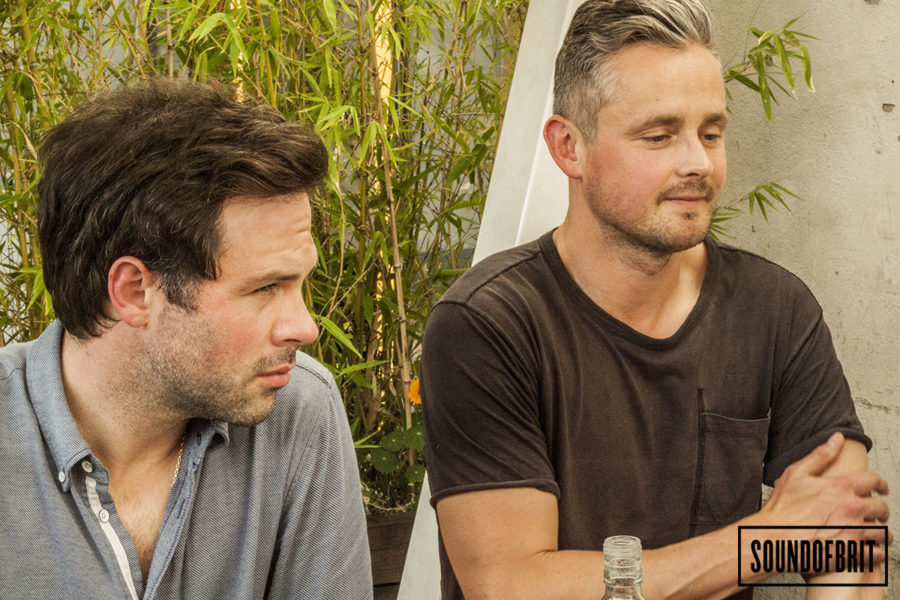
Qu’est-ce qui vous a décidé à rejouer ensemble? Il y a eu une longue période de pause après The Wave.
Richard : Nous savions que Tim avait écrit un tas de chansons, et nous pensions que ce serait un album solo de Tim en devenir. Il n’était pas sûr. Puis, on nous a proposé de faire un concert de charité dans notre ville d’origine. On était tous emballés par cette idée. C’était pour le projet Music Outreach, qui encourage les jeunes à apprendre la musique, on s’est dit que ce serait cool. On y est allés sans pression. Nous avons été surpris de voir à quel point ça nous a plu de jouer ce concert, et juste d’être ensemble. Puis de nouveaux morceaux se sont rajoutés… Donc oui, cela
nous a pris un petit moment, mais on a tous des choses à faire, on a des enfants, d’autres gens dans nos vies. On ne peut plus faire comme à l’époque de Hopes & Fears où on pouvait déménager en France pendant trois mois et s’enfermer en studio ! On fonctionne différemment aujourd’hui.
Le concert de ce soir a été complet en moins d’une minute. Avez-vous prévu de revenir jouer en France bientôt ?
Richard : Nous avons vraiment envie de voir d’autres endroits [en France]. Je serais surpris que nous ne revenions pas jouer à Paris.
Interview : Lauren
Photos : Anne Line
Transcription et Traduction : Lauren (@0ccupyy0urmind), Lizzy (@LyricallyTC )& Anne-Line (@AnneLine_P).



No Comments